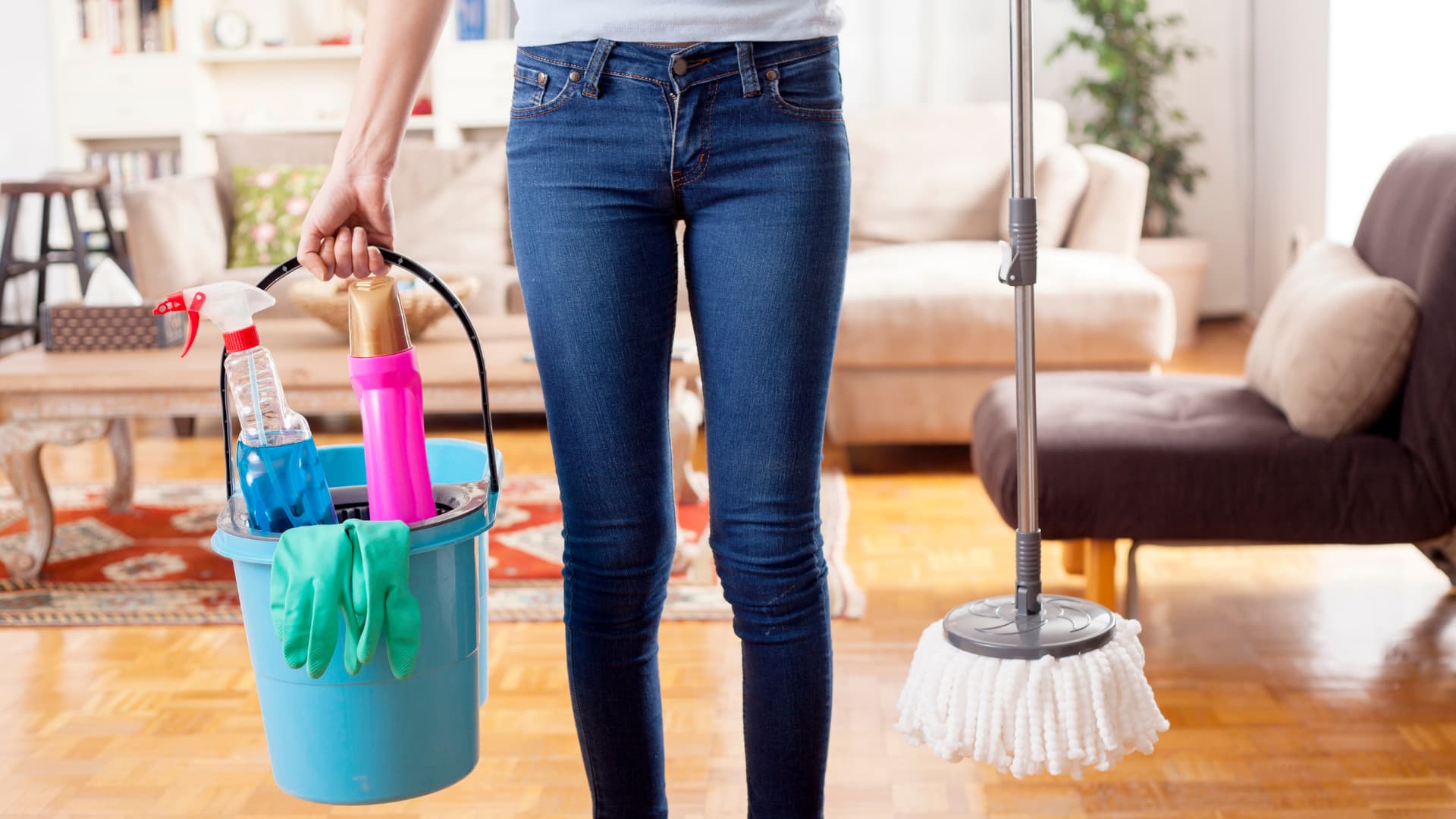No matter if you live alone, with roommates, or have a family to accompany you, house chores will always be there. Yep, that’s the sad reality of adulting we just can’t deny. And the tricky part is, your daily tasks won’t ever end.
There will be clutter, messy sinks, undone dishes, and smelly socks haunting you if you don’t follow a proper cleaning routine. If you don’t want to end up with endless tasks and too little time, how about a quick cleaning routine you can follow during weekdays and enjoy your weekends without stressing over cleaning?
Sounds good, right? If that’s what you want, you’re in the right place. Today, I’ll help you create some daily cleaning routines that won’t burn you out and keep your home tidy.
So, let’s get to work and pick some healthy habits while we are at it!

7 Daily Cleaning Routines To Get And Stay Organized
If you’re tired of seeing the dirtiness in your home, it’s time to make a plan and stick to it. The more you overlook your house cleaning checklist, the more mess you’re going to see. So, here goes:
1. Make Beds First
If you leave your bed as it is every morning, thinking you’ll make it later, you might come back to the same messy bed at night. Start your cleaning day by making the bed(s) to ensure at least the rooms look presentable.
If there are kids’ bedrooms in your daily house cleaning routine, assign some extra time to this task. Don’t put it off. When the beds are made, and there are no wrinkled/dirty sheets to spoil your mood, your list of built-up cleaning chores feels easier.
By doing this, you also invest in your child. By making it a habit to make your bed each day (and, when your child is old enough, doing it together), you show your child what ‘normal’ looks like.
2. Put Things Where They Belong (On The Go)
People who have good daily routines stick to healthy cleaning habits, especially on weekdays. You should put everything back where it belongs right after using it (for example, remotes, magazines, books, throw pillows) to stay in line with your busy schedule.
When you let things remain scattered around the house, your daily cleaning routine will take some extra minutes, and the results still feel insufficient.
So, whenever you see something out-of-place, put it back right away. If all family members have busy schedules, there should be a rule not to scatter things and keep them in the designated spots. Everything has a home!
3. Clean High-Activity Areas Every Day
If you want to adopt healthy cleaning habits, start with wiping/cleaning your home’s high-activity areas every day. Instead of waiting for your monthly cleaning schedule, wash that sink every time you use it and dry the shower curtain after every shower.
Also, regularly empty your vacuum cleaner’s trash bag and the dishwasher’s bottom rack to ensure things remain easy to manage.
If you’re responsible for cleaning the whole house, stick to the most used parts in your everyday cleaning and leave the others for your deeper cleaning sessions.
4. Wash the Dishes After Each Meal
I know, a sink full of dishes feels like a burden too big after a hard day’s work. But I tell you, starting a new day, only to find a pile of unwashed dishes in the sink from the evening before is even worse!
If you don’t want your kitchen to stink and the dishes to get discolored, wash them after each meal. Dishwashing should be a part of your daily routine because once you start piling these buddies up, you’ll be standing next to a load within no time.
However, if you’re always short on time and there are not too many dishes for you to wash, you can make this task a part of your weekly cleaning schedule. Just make sure you have enough dishes to remain for a couple of days and make sure the unwashed dishes are covered and away from the sink.
5. Don’t Let the Trash Pile Up
Good daily routines revolve around consistency and smart planning. When you don’t let house chores accumulate, you can better manage your time and home.
When your trash can is often full and you don’t get the time or energy to deal with it, make this task a daily habit.
You can keep a trash bin by the door and take the bag out of it while going to work or running errands. Once this becomes your habit, it won’t feel like a tough task, and your bin will mostly be empty.
6. Dirty Clothes Belong in the Laundry Bin
Always keep the dirty laundry in a basket and place that basket in the laundry room to keep things tidy.
When you let dirty towels, clothes, and socks be anywhere in the house, they waste your time when you have to run a quick load of laundry.
So, instead of letting these things be on the floor or in the bathroom, gather them and put them where they belong. When it’s time to do laundry, you won’t have to scour through the house to collect them.
7. Keep Your House Decluttered
This one golden tip never feels irrelevant. Whether you’re tired of overloaded cupboards, bookshelves, or kitchen cabinets, here’s what you do: declutter, declutter, declutter.
Don’t keep things in your home you don’t or won’t use. Less stuff means lesser cleaning effort and time, so you should decide accordingly.
You can give away old clothes, put recyclables away, or simply bin some of the old stuff so that your cabinets and cupboards can breathe.
Plan Ahead And Use a House Cleaning Schedule
An actionable everyday cleaning schedule can keep your home presentable and tidy at all times.
If you don’t want to bust your weekends mopping floors and doing laundry loads, adopt a daily cleaning routine.
This schedule can be 10-20 minutes max, but if you stick to it, your home will never look messy and cluttered.
Use my deep-cleaning checklist and divide your chores into doable every day chunks instead of going all-in at a particular time.
FAQs On Daily Cleaning Routines
How do I write a cleaning plan?
You can either get a printable cleaning checklist or make one yourself. Write the most important tasks first (like doing dishes and cleaning the living room) and gradually add other chores.
You can keep tasks like mopping, vacuuming, and window cleaning for a weekly cleaning schedule and stick to a quick clean-up every day.
How do I create a weekly cleaning chart?
Laundry should be the first task of your weekly cleaning chart because we hardly get time to accommodate laundry in our daily schedules.
Besides laundry, vacuuming, window cleaning, cupboard organization, and decluttering are some other chores for your weekend chart.
How can I be more productive?
Well, it’s all about a better lifestyle and making the most out of your time.
If you need some quality time on your free days (and who doesn’t really), you have to take action. Start with small actions like regular dusting, tidying, organizing, etc., and slowly indulge in the tasks that stress you out.
Also, check out these articles to find out what works best for you:
What is the 80/20 rule for productivity?
This rule states that 20% of your time brings the results you see 80% of the time. If we put this rule in perspective about our topic, the 20% time you spend cleaning will keep the remaining 80% of your time stress-free.
Is procrastination a mental illness?
Although procrastination is not a diagnosed mental illness, it can sometimes stem from attention deficit, which is a mental condition.
So, unless someone is diagnosed with attention deficit disorder, their procrastination is more of a personality trait.
What is the two-minute rule?
The two-minute rule is a kick-starter to get us out of the procrastinating zone. When you don’t feel like doing a particular chore (like cleaning), tell yourself that you’re only doing it for two minutes. And if you manage to get through these two minutes, you’re likely to complete that task.

MORE ABOUT CLEANING & ORGANIZATION:
- The Ultimate List Of Things You Forget To Clean (With Free Checklist)
- 22 Free Printable Chore Charts For Kids Of All Ages
- The 12 Best Professional House Cleaning Tips That Will Save You Time Energy And Money
« How To Organize Mugs In 5 Easy Steps
» How to Organize Cleaning Supplies
You’re welcome Shirley!
I am the worst at planning ahead. But, having a schedule is so necessary and has proven super helpful to me. Thanks for the tips
Excellent tips.I am so guilty of not following #6 haha. Thanks.
I admit I am TERRIBLE at number 4. What is the psychology behind it? I’ll never know. I’ll leave the dishes to pile up, and then groan when I have no forks left. It would’ve been easier to clean as I go (my brother does that) but I can’t seem to pick up the habit. Ha! Thanks for the super useful list!